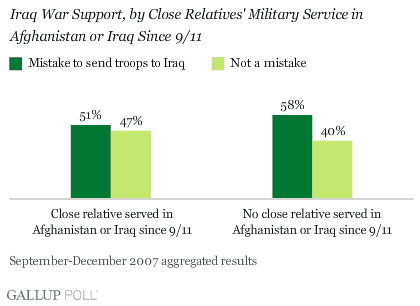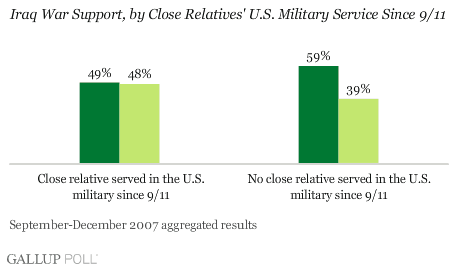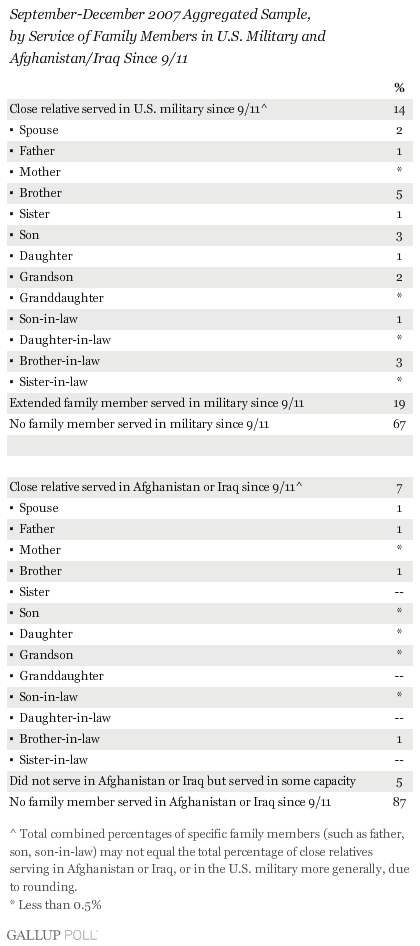PRINCETON, NJ -- An analysis of recent USA Today/Gallup polls shows that Americans with close family members who have served in the military since the Sept. 11 terrorist attacks -- including those who have served in Afghanistan or Iraq -- are divided in their overall views of the war. About half of this group says it was a mistake to send troops to Iraq. Most Americans who do not have a close relative who has served in the military since 9/11 also say the war was a mistake.
This finding is based on aggregated results of four polls conducted between September and early December 2007. Poll respondents were asked if they "have a close relative who has served in the U.S. military in any capacity since the Sept. 11th terrorist attacks," including a parent, child, sibling, spouse, son-in-law, or daughter-in-law. Fourteen percent of Americans fit this description.
Respondents who said they had a close relative in the military were asked if any of those relatives "served in either Afghanistan or Iraq since the Sept. 11th terrorist attacks." Roughly half of those with a close relative in the U.S. military since 9/11 have had a close family member serve in Iraq or Afghanistan since 9/11. That translates to 7% of all U.S. adults.
Of the 7% of Americans who report having a close family member who has served in Iraq or Afghanistan since 9/11, 51% say it was a mistake to send troops to Iraq, while 47% say it was not a mistake. That compares with 58% of those without a close relative serving in Iraq or Afghanistan who say entering Iraq was a mistake.

The pattern of results is essentially the same for the larger group of Americans with a close relative who has served in the U.S. military since 9/11 -- either in Iraq or Afghanistan, or in some other capacity. Forty-nine percent of these respondents say it was a mistake to send troops to Iraq and 48% say it was not a mistake. By comparison, 59% of those without a close relative serving in the U.S. military over this period of time say it was a mistake to send troops, and only 39% say it was not a mistake.

The accompanying table shows the incidence among the U.S. population of family members serving in the military or in Iraq since 9/11.

Survey Methods
Results are based on telephone interviews with 4,067 national adults, aged 18 and older, conducted across four polls from September 2007 through early December 2007. For results based on the total sample of national adults, one can say with 95% confidence that the maximum margin of sampling error is ±2 percentage points.
For results based on the sample of 548 adults who have a close relative who has served in the U.S. military in any capacity since the Sept. 11 terrorist attacks, the maximum margin of sampling error is ±4 percentage points.
For results based on the sample of 301 adults who have a close relative who has served in the U.S. military in Afghanistan or Iraq since the Sept. 11 terrorist attacks, the maximum margin of sampling error is ±6 percentage points.
In addition to sampling error, question wording and practical difficulties in conducting surveys can introduce error or bias into the findings of public opinion polls.
